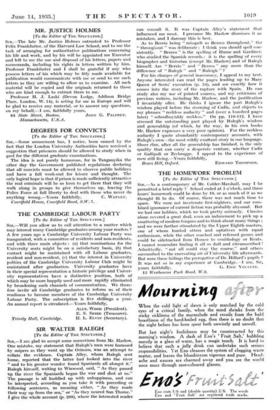SIR WALTER RALEGH
[To the Editor of THE SPECTATOR.] Sta,—I am glad to accept some corrections from Mr. Harlow. One mistake, my statement that Ralegh's men were harassed by snipers as they went up the Orinoco, was an attempt to collate the evidence. Captain Alley, whom Ralegh sent home, reported that the latter had looked into the river " and to his greater wonder found Spaniards all alongst it." Ralegh himself, writing to Winwood, said, " As they passed tip the river the Spaniards began the war and shot at us." The passage is all huddled up with unhappiness, and can be interpreted, according as you take it with preceding or following sentences, as meaning either, " As they made their way up from the sea," or "As they neared San Thome." I give the whole account (p. 289), where the interested reader
can consult it. It was Captain Alley's statement that influenced me most. I presume Mr. Harlow dismisses it as mistaken, and I daresay this is best.
As to Berrio being " misspelt as Berreo throughout," the " throughout " was deliberate ; I think you should spell con- sistently. " Berreo " is the spelling of Hume and Gardiner, who studied the Spanish records ; it is the spelling of every biographer and historian (except Mr. Harlow) and of Ralegh himself. Are " Berrio " and " Berreo " any more than the difference of " Ralegh " and " Raleigh " ?
For his charges of general inaccuracy, I appeal to my text. Anyone interested can read the pages leading up to Mary Queen of Scots' execution (p. 54), and see exactly how it comes into the story of the rupture with Spain. He can study also my use of printed sources, and my criticisms of previous writers, including Mr. Harlow, and the justification I invariably offer. He thinks I ignore the part Ralegh's wisdom played before the storming of Cadiz, and objects to my phrases " reckless audacity " and (over a hundred pages later) " sehoolboyishly reckless." On pp. 110-112, I have stressed the outstanding part played by Ralegh's wisdom and generalship (of which, by the way, in his oivn books Mr. Harlow expresses a very poor opinion). For the reckless audacity I quote abundantly contemporary accounts, with Ralegh's own—the most wildly exultant story in our language. Sheer élan, after all the generalship has finished, is the only quality that can carry a desperate venture, whether Cadiz or Gallipoli or Zeebrugge. I appeal to the experience of men still living.—Yours faithfully,


















































 Previous page
Previous page